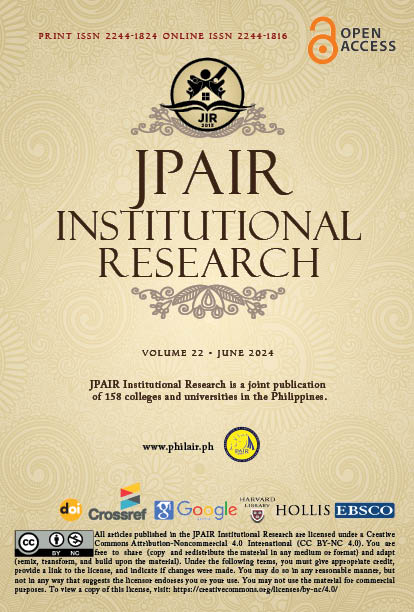Curriculum Assessment on Navigation 1 among Students, Instructors and Administrators
DOI:
https://doi.org/10.7719/irj.v22i1.883Keywords:
curriculum Assessment, Navigation 1, Teaching Method, Course Materials, Course Goals, Self-Assessment, Assessment Method, policy development, PhilippinesAbstract
The Curriculum Assessment on Navigation 1 at the Merchant Marine Academy of Caraga Inc. is crucial for ensuring the competence and safety of future mariners. This quantitative research involves maritime students in their 2nd and 3rd years, instructors, and administrators as respondents. The study aims to evaluate the Navigation 1 curriculum, focusing on students' study habits, academic performance, teachers' profiles, instructional delivery modalities, and perceptions of the curriculum by students, administrators, and instructors. Data collection includes questionnaires and statistical analyses like frequency distribution, weighted mean, and chi-square tests. Initial findings indicate a high level of agreement and positive perceptions across various aspects of the curriculum, with an overall weighted mean of 3.72. The study suggests that the Navigation 1 curriculum effectively meets its objectives. Future research should assess the long-term effectiveness of the curriculum by tracking graduates' performance, gathering industry feedback, and integrating new technologies to enhance student preparation for real-world navigation challenges.
References
Hattie, J. (2008). Visible learning: A synthesis of over 800 meta-analyses relating to achievement. routledge.
International Maritime Organization. (2020). International Convention on Standards of Training, Certification, and Watchkeeping for Seafarers (STCW), 1978. Retrieved from https://www.imo.org/en/OurWork/HumanElement/Pages/STCW-Convention.aspx
Jaafar, Z. (2017). An English Course for the Students of Marine Sciences. Universiti Malaysia Terengganu Press.
Downloads
Published
Issue
Section
License
Copyright (c) 2024 Rey David Bringas, Victor Felias, Jhon Paul I. Arellano, Cm Maximino Ebarle, Reen David Karll V. Mamogay, Nikko James P. Nisperos, Jee Mark T. Puebla, Rey F. Remitar

This work is licensed under a Creative Commons Attribution-NonCommercial 4.0 International License.
Open Access. This article, published by JPAIR Multidisciplinary Research, is licensed under a Creative Commons Attribution-Noncommercial 4.0 International (CC BY-NC 4.0). You are free to share (copy and redistribute the material in any medium or format) and adapt (remix, transform, and build upon the material). Under the following terms, you must give appropriate credit, provide a link to the license, and indicate if changes were made. You may do so in any reasonable manner, but not in any way that suggests the licensor endorses you or your use. You may not use the material for commercial purposes.












